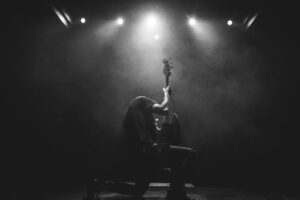JOURNEYS TO HUMANISM | Dissecting Truth from Fiction through Music
 Photo by Greyson Joralemon on Unsplash
Photo by Greyson Joralemon on Unsplash Journeys to Humanism, theHumanist.com’s regular series, features real stories from humanists in our community. From heartwarming narratives of growth, to more difficult journeys, our readers open up about their experiences coming to humanism.
Kevin McKinney
Salunga, PA
I just want to give heavy metal music the props it deserves.
As a kid, I only saw my father every other weekend and stopped going to church after my parents divorced when I was ten years old. Music became my role model and father figure.
During this time, in the 1980s, a lot of that music was being banned and shunned. Music helped me open my eyes to the rest of the world’s views on religion. To me, there were a lot of religious teachings and more that didn’t match up to the reality of the world. Music dissected the truth from fiction.
Some of the more “out in left field” music—like satanic bands, death metal, etc.—were a perfect balance to the outright uptightness and aloofness of most of the religious ways of thinking about modern life. The mainstays of heavy metal, by contrast, were what always brought me back to that middle line “fence” my friends and I liked to sit on, and it showed us what we couldn’t see with our pre-adult minds.
I may not be explaining this as well as I could, but music helped me face my fears of hell, of not being wanted if I wasn’t included in the church’s “cool club”, etc. It was the perfect avenue to get out pent up frustrations (also as a primal scream therapy) while actually helping me to understand the world as a whole, not just through the filtered lens I had been given to see out of since childhood. As I stated earlier, music filled the hole of my father not being there and replaced it with a sense of belonging that was strong enough to wash away most—if not all—of the religious dogma that had been crammed down my throat.
I wasn’t a perfect child or teenager (I got in more than enough trouble), but the music I listened to grounded me in learning lessons through cold hard facts and reality that couldn’t be denied by beliefs. I had no fear of confronting the things the church uses to control the masses, like the threat of hell, the feelings of belonging and community, convincing people they are a broken object in the eyes of a master, preying upon the sadness inside of people, and the idea that I needed to respect their beliefs.
I was an outcast in the eyes of the majority (back then), and I couldn’t have been happier with embracing that as what I embodied in my transformation to an adult. I have been a single parent for the past thirteen years and the son I have raised has the empathy, thoughtfulness and compassion to be a decent person to any and all that he meets in his life—all without a religious foundation. I couldn’t be prouder that he is who he is without religion, without fearmongering, or blame and shame, to do what is right in this life for himself and those he encounters on his journey. It kills me inside to think that most of my family thinks we are heathens and cast out from what they consider the only true reality of their religious beliefs, but I wouldn’t have it any other way. My son doesn’t listen to heavy metal (he thinks I’m a weirdo sometimes), but that is fine by me. He is his own person and I have never wanted to force my way of life into being his way, too.
Today, I still feel enough of the strength of resolve to do what is right when faced with overwhelming odds against my favor, and I have to thank my musical brothers and sisters for giving me the opportunity to express that when otherwise I would have been run through by the machine that is human life.
“In destruction there is creation…”
—Entombed
We all have our own stories of how we came to be humanists, and we want to hear yours! Fill out the form here to be featured in this series. You can also share your journey and chat with others on the Journeys to Humanism channel on the AHA’s Discord Server.
